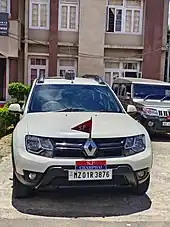
Superintendent of Police (SP), also known as Deputy Commissioner in a Police Department, is a senior rank in the Indian Police Service (IPS) and of respective States' State Police Service (SPS), and a senior level post of the police service. They wear a star and an Ashoka emblem on their epaulettes with 'IPS' or 'SPS'(as in 'MPS' for Mizoram Police Service, 'KPS' for Kerala Police Service) below. The larger and more important districts in India are headed by a senior superintendent of police (SSP), while smaller districts are headed by a Superintendent of Police (SP). The administration of a Police district is vested upon the SP.
It may be noted that Superintendent of Police is both a rank of the police service in India and a post of a police officer of this rank or higher. As such, even officers at the SSP rank are sometimes posted as Superintendent of Police of a District. In the state of Kerala, the Superintendent of Police (SP) who is in charge of a police district is referred to as the District Police Chief (DPC). However, in certain other states, the title District Superintendent of Police (SP) is more frequently used. In Kerala, the term District Police Chief is more prevalent. [1][2]
Below the SP, there are Additional Superintendent of Police (Addl. SP) and Deputy Superintendent of Police (Dy. SP/DSP). A Dy. SP who is in-charge of a sub-division is also called Sub-Divisional Police Officer (SDPO). Above the SP, there are the Senior Superintendent of Police (SSP) also known as Superintendent of Police (Selection Grade), Deputy Inspector General of Police (DIG), Inspector General of Police (IG), Additional Director General of Police (ADG) and Director General of Police (DG).
Term of Office
Superintendent of Police posted as a District SP has a term of a minimum of two years and a maximum of three years subject to other circumstances.[3]
Deputy Commissioner of Police
Deputy Commissioner of Police (DCP) is a post in the Police Commissionerate, a police system existing in major cities of India. The Commissioner of Police (CP) is the head of the city police force. In the hierarchy DCP is below Joint Commissioner of Police (Joint CP) and above Additional Deputy Commissioner of Police (Addl.DCP). The Deputy Commissioner of Police has the rank of Superintendent of Police (selection grade) or Superintendent of Police (SP). The Deputy Commissioner of Police is equivalent to Superintendent of Police in the district.[4]
The Deputy Commissioner of Police heads a division or a unit in the police commissionerate. The superintendent of police who is the District Police Chief has no executive magisterial power.[5][6]
Roles and Responsibilities
The Superintendent of Police in India may be assigned various roles and responsibilities other than being the district police chief. They need to use their skills and expertise to ensure that law and order is maintained, and public safety is ensured in their assigned role. An SP may be appointed as the head of a unit or specialised wing in the police department. Such as head of telecommunication, motor transport, administration, special operations group, special investigation team, special cells, intelligence detachment, crime branch unit,etc. Commandants of various armed police battalions are officers of the rank of Superintendent of Police.
The post of the Superintendent of Police is the head of the police district of a State and the head of the District Executive Force (DEF). Each district of a State is a DEF. A Police District is an area within the state that is declared by notification by the State Government, after consulting with the Director General. The Superintendent of Police is in charge of the police administration in such district and may have the assistance of any number of Additional, Assistant or Deputy Superintendents, as notified and necessary. The District Executive Force is administratively under the overall supervision of District Superintendent of Police who works under the direct supervision of Dy. Inspector General of Police in charge of the Police range under which the district lies. There may be several sub-divisions under this which are headed by the Sub-Divisional Police Officer who is typically a relatively junior rank of the SPS and a probationary post among IPS officers. Sub-divisions may have a number of police stations and beat posts which are headed by an officer of the rank of Inspector of Police.
Coordination with District Magistrates
The police manuals state -
For the purpose of efficiency in the general administration of the district, it shall be lawful for the District Magistrate, in addition to the provisions of the Code of Criminal Procedure, 1973 and other relevant Acts, to coordinate the functioning of the police with other agencies of district administration in respect of matters relating to the following:
- the promotion of land reforms and the settlement of land disputes;
- extensive disturbance of the public peace and tranquility in the district;
- the conduct of elections to any public body;
- the handling of natural calamities and rehabilitation of the persons affected thereby;
- situations arising out of any external aggression or internal disturbances;
- any similar matter, not within the purview of any one department and affecting the general welfare of the public of the district; and
- removal of any persistent public grievance.
In terms of seniority and general power-of-the-post level in State Civil Services (SCS) and State Police Services (SPS) between the DC and Superintendent of Police (SP) in a District, the DC is a higher ranked post than the SP as is evidenced by their seniority grades and grade pay - SPs are generally Junior Administrative Grade ranked officers while DCs are generally Selection Grade and Supertime Grade B officers. It may also be mentioned that while the DCs domain covers all aspects of polity and economy including law and order and police administration at the Department level while the SPs domain is limited to Police business only. In terms of grade pay, SCS officers who may be posted as DC are in the grade pay of Level 13 and 13A while SPS officers who may be posted as SPs of a district are in the grade pay of Level 12.[7]
Entitlement

For the use of Superintendent of Police, state governments can issue a state car for official use, which cannot be used for the officer's personal use. They can also be allotted a government residence, along with guards. SPs are also given Personal Security Officer (PSO), stationed in office for SP's protection.
In Commissionerate system
Many important cities in India have the commissionerate system of police rather than an SP-led police system. In this system, the head of the police department is called the commissioner of police (CP). While the superintendent of police (SP) is called a deputy commissioner of police (DCP).
References
- ↑ Bureau, The Hindu (2022-11-19). "New police chief assumes charge in Alappuzha". The Hindu. ISSN 0971-751X. Retrieved 2023-05-05.
- ↑ "Police chief lashes out at SP, Commissioners for lapses". OnManorama. Retrieved 2023-05-05.
- ↑ "Mizoram Police Act, 2011" (PDF). Mizoram Police. 2012-01-12. Retrieved 2023-04-28.
- ↑ "Now, commissioners to replace SPs in Agra as district gets new policing system". India Today. Retrieved 2023-05-03.
- ↑ Emmanuel, Meera. "Madras HC questions validity of deeming Deputy Commissioners of Police in TN as "Executive Magistrate", giving them judicial, jailing power". Bar and Bench - Indian Legal news. Retrieved 2023-05-03.
- ↑ "DCPs of Tiruchirapalli and five other cities get magisterial powers". The Hindu. 2014-07-25. ISSN 0971-751X. Retrieved 2023-05-03.
- ↑ "Civil List of Mizoram State Government, October, 2022" (PDF). Department of Personnel and Administrative Reforms. 2022-10-17. Retrieved 2023-04-28.
